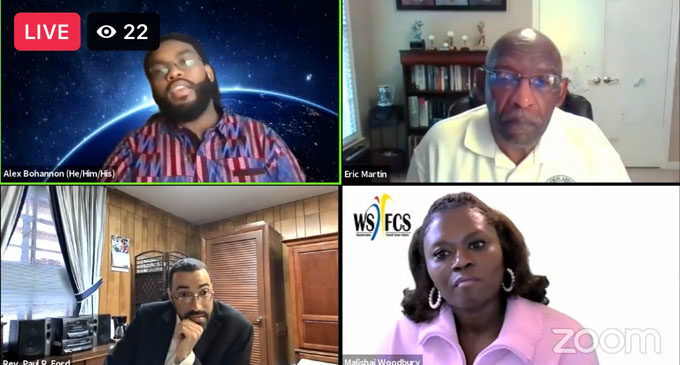EDTalk brings equity in public schools to center stage
File photo The EDTalk Virtual Forum shed light on equity in public schools.

How is Winston-Salem/Forsyth County School (WS/FCS) advancing equity in schools across the district? What are some of the challenges the WS/FCS face when it comes to advancing equity? Those were just a few of the questions posed to School Board Chair Malishai Woodbury and board member Alex Bohannon during an open forum hosted by the Big 4 Alumni Association, Action4Equity, and Heritage 365.
The virtual forum was the first of a series titled EDTalk: Achieving Equity, which is designed to shed light and share dialogue on some of the inequities across the district. After introductions during the virtual event held last Sunday, hosts Eric Martin, president of the Big 4 Alumni Association, and Rev. Paul Robeson Ford, pastor of First Baptist Church (Highland Avenue) asked Bohannon and Woodbury to discuss how the district leaders are advancing equity in public schools.
Last year WS/FCS adopted Equity Policy 1100 to help raise student achievement and eliminate gaps created by racial and cultural disparities. The policy focuses on “Five Pillars of Equity”: school policy and organization/administration, school learning environments, academic placement, professional learning, and standards and curriculum development. When discussing Policy 1100, Woodbury, who has served as chair of the school board since 2018, said the Equity Policy is a way the community can hold the board accountable for ensuring equity for every student in the district.
“You cannot hold us accountable unless it’s law, unless there is some kind of regulation that states it’s the case,” Woodbury continued. “I think we were very intentional on our part … it is a commitment to educational equity that involves the removal of institutional barriers so that all students regardless of their race, social-economic class, language proficiency, gender, sexual orientation, disability, or ethnic background, can benefit from all aspects of the learning environment and I would definitely invite people to read the Equity Policy so they can see where we stand.”
In the three years she has been on the board, Woodbury said she has seen progress in several areas including the increased enrollment of minority students in AP and Honors courses. Woodbury said that thanks to the Equity Policy, there is now a plan in place that advocates for minority students to take more advanced courses.
“We saw there was a gap between students of color and white students taking the courses, so we have a very intentional and strategic plan in place now to ensure that we advocate for students of color to take these courses,” she said.
Bohannon, who was chosen earlier this year to fill the vacant seat left by Barbara Burke, was asked, what does equity in public school look like? He said before we can focus on equity in schools, first we have to ensure equity is embedded throughout the community. “I know the conversation here is relegated to schools, but I think that we have to understand that there is power in equity and embedding it into every single facet of life and in every single institution that touches the lives of human beings,” he said.
Another hot topic during the forum was centered around House Bills 69 and 32. HB 69 or the Gizella Abramson Holocaust Education Act, would require North Carolina public schools to teach students about the Jewish Holocaust. Many organizations across the state have urged lawmakers to revise the bill to include all cultures. HB 32, also known as the Equity in Opportunity Act, would expand school choice by increasing school choice vouchers.
Although HB 32 is sponsored by Rep. Donny Lambeth of Forsyth County, Woodbury said before the bill was filed, none of the state elected officials reached out to her to discuss it or hear her opinion. She said there needs to be more communication between the school board and lawmakers.
“We need to definitely reconnect with the delegation because since the pandemic, the meetings that we would normally have, we have not had,” Woodbury said. “I would’ve liked to have been on the front end of it as a Forsyth County citizen before the bill was actually introduced … Even though I will not be a proponent of House Bill 32, had we known about it on the front end, there could’ve been conversations about what could’ve been in it that could’ve benefited citizens not only in Forsyth County, but throughout the state.
“We need to do whatever we need to do on both sides to ensure we’re meeting and talking to each other around the development … not when it’s proposed and done, but the development of the bill and the policy.”
When discussing HB 69, Woodbury said she supports those who believe all cultures should be inlaced in the bill. During the forum, board members Lida Calvert-Hayes and Leah Crowley also joined to discuss school choice.
After passing the first reading in February, HB 32 and HB 69 were sent back to the Appropriations Committee last week.
The EDTalk: Achieving Equity virtual forum can be viewed on the Action4Equity Facebook page. It is unclear when the next forum will be held.











